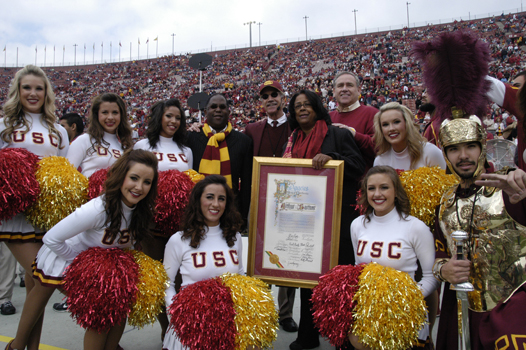Dr. Arthur C. Bartner, director of the University of Southern California Trojan Marching Band looks back on his 40 years—building a career, a family and a legacy.
Photo by Ben Chua
The last time the University of Southern California (USC) hired a marching band director, Richard Nixon was president and The Beatles had just announced they were disbanding. Now celebrating his 40th year as director of “The Spirit of Troy,” the University of Southern California Trojan Marching Band (TMB), Dr. Arthur C. Bartner is the second-longest tenured college band director, after Wisconsin’s Michael Leckrone. In his time at USC, the TMB has recorded two platinum albums, performed in 17 countries, been invited to four Super Bowls, several Grammy’s and Academy Awards programs … and even played for the Pope.
Born in New Jersey, Bartner received his bachelor’s and master’s as well as his Ed.D. in Music Education from the University of Michigan where he played trumpet for four years in the Michigan Marching Band. Halftime Magazine caught up with Bartner to discuss his storied career, his inspirations, his philosophies and the thing closest to his heart—his beloved band.
Halftime: How did you become USC’s director?
Bartner: USC had played Michigan in the Rose Bowl the January before I was hired. And the Michigan band was absolutely splendid. And the USC band was absolutely dreadful. USC won the football game, but the differences between the bands were like the differences between night and day. And so they were looking for a replacement. After about four guys turned down the job, local guys, they went back to Michigan, and they looked for a Michigan guy. I was that guy.
Halftime: What were you doing before USC?
Bartner: I taught high school for seven years. I was working on my doctorate. So I was ripe, I was going to go somewhere. So I ended up here. It was a great job. The band was awful, but it was a great job.
Halftime: So your work was cut out for you then. How do you start rebuilding a marching program?
Bartner: You rebuild it through the students. You rebuild it inside out. And it has to become their band; they have to have ownership. It wasn’t that way. Basically, the band I had inherited was pretty much music majors who needed the band for their scholarships, so they’re out there for all the wrong reasons. There was no pride; there was no sense of tradition; there was no sense of empowerment. So basically you have to clean the house, get control of the scholarships, so that you don’t have to depend on the music majors. And then you have to get a group of guys who really want to see something happen, who want to see a great band and develop it.
Halftime: People buy into this band as a family. You have players coming back years after they graduate to perform. Is that part of the band’s success?
Bartner: There are certain ways, in my opinion, to judge, to evaluate, a successful band program. And one of them is the return rate. For a private university, we have a tremendous retention rate. Kids come back because they love the experience. They love the camaraderie; they love the bonding, the friendships, the trips, all of those things. And I think the great bands—the Ohio States, the Michigans—they have this mystique; they have this personality that makes them special.
And also, how the band is perceived on campus by the student body, by the alumni, by the faculty. This band is, in a lot of ways, the face of this university, the window of this university. Now granted, it’s pretty hard to top the football team. But still the band, with all the visibility, all the shows that they’re on, I think this becomes a real source of pride for the university.
Halftime: A pride that wasn’t there before you arrived?
Bartner: Oh yeah, nobody called this band, wasn’t very good … After 40 years it’s just gotten better and better. [But what matters] is that each college has a great band that represents the traditions of that college. And I think USC is a very, very special place. Being in Los Angeles and our relationship with our football team are very unique. The fact that we can do “Dancing with the Stars,” we can have George Lopez [guest conduct], play on “The Jay Leno Show” …
Halftime: And play for the Pope.
Bartner: Play for the Pope. He was behind a glass mobile or something, but we were there. Yeah. And we’ve played for six presidents, and we gave President Reagan a helmet. You know? Who can say that? And that’s why these kids, I think, they come back because they genuinely like each other.
Halftime: You said that one of the things that you’re proud of is your relationship to the football team. Now, this year has been kind of a trying time for the football team. How much of a band’s success hinges on the team’s success?
Bartner: Our mantra is: It shouldn’t matter to us whether we’re winning by 30 points or losing by 30 points. We play the same tunes; we should have the same amount of energy, the same amount of support, cheer, volume. Now, that might be tough when you’re losing by 30 points to Stanford, and your crowd has basically given up. They’ve all left. But the band is still there, and they’re still playing the tunes. They’re still our students out there, suiting up, trying to make a tackle. And that’s been my philosophy, dating back to [former USC football coach] Marv Goux in the early 70’s, and I think the band’s done a very, very good job of supporting this team all the way to the end when there was no chance.
Halftime: Football coaches often talk about turning boys into men. Do you have a similar relationship to your students?
Bartner: Absolutely. That’s the big picture. And the big picture is that these are life lessons. We don’t teach calculus and languages. Those are academic lessons. What we teach are life lessons. And life lessons [are] that you have to be held responsible. You have to be held accountable. And if you break a rule, you have to pay the consequence. You don’t act accordingly, you don’t try hard, you don’t memorize your music, you cut practice, you have to pay the consequences. Hopefully they leave this program, and they’re better for it. And that’s, you know, that’s the big picture. That’s why you go to college. You go to college to grow.
Halftime: After 40 years, how do you keep things fresh? How do you stay motivated?
Bartner: If you believe these songs cannot arouse our football team, our student body, our alumni, well then I shouldn’t be here. And we play “Tribute to Troy” 50, 75 times a game. … It’s almost a spiritual thing. And it’s got to be played the same way every time or else. And that’s why people get so upset. People meaning, “the opposition.”
And we sing “Fight On” after every win, we sing it every time we score a touchdown, we sing it at the end before we dismiss. See, this is the stuff that makes USC special. We got these three tunes, and we believe in these tunes. We believe in being a Trojan. This is a way of life. And “Conquest,” to us, is an anthem. This is an anthem! It’s like “The Star Spangled Banner.” At the end of the Rose Bowl, the team comes over, you got the student body there, the alumni are around who decided not to beat the traffic, and everybody’s got their fingers up and they’re singing, and they all do that horn call. That’s great stuff. And the great bands, the great universities, the ones with the great traditions, they have that.
Halftime: So is that what you consider to be the highlight of your career?
Bartner: That’s the best moment. You know why? Because for that minute and 45 seconds, you have the epitome of the Trojan family. Everyone talks about the Trojan family. But you experience it at that moment. Everybody’s celebrating this moment. You live for moments, those moments. And nobody’s thinking about tomorrow, nobody’s thinking about yesterday, all they’re thinking about is that moment. To me, that’s what it’s all about.
Halftime: You were talking about the band’s character earlier. What do you think of its reputation off-campus, how other bands perceive it?
Bartner: Everyone has to do their own thing. Now, and this goes back to Marv Goux, who didn’t teach me to do this [starts mock conducting]. He didn’t teach me the musical elements. [He] taught me this thing about being a Trojan. And he taught me about running this band like a football team.
This is a very athletic band. So there is this kind of jock approach. Now my job is to keep the identity of this band. But also to keep it under control. You don’t want this band to overstep its boundaries. You don’t want this band to embarrass the university. But this is an aggressive band. This band does have an edge. This band doesn’t like to lose.
Halftime: You’ve been quoted that you’d end your career here. Is that still true?
Bartner: Oh yeah. I made that career choice after the 1984 Olympics.
Halftime: You’re referring to conducting the Olympic All-American College Marching Band?
Bartner:That was probably the pinnacle of my career. I was probably, at that moment, the top band director in the country. I’m not saying I was the best. But I had this opportunity. And I had offers. But you know, I made the decision back in ’84, this is my job. This is my life. And if I was going to leave, that was going to be my moment. But I decided to stay and have been happy ever since.
Halftime: One of the things I’m sure will be missed when you do retire is your fundraising. What are some of the things you’ve learned on the fundraising trail?
Bartner: I think people sense how sincere I am about this program. And it’s not about me. It’s about those [kids]. Those are the guys that are out there 12, 15 hours a week. I get paid to be out there. These guys don’t get paid. They might get a couple of bucks here and there, stipends. But there’s no band full ride. And I genuinely think the Trojan family is appreciative of the effort these kids put in, day in and day out. But I like it. And I have a great sell. I’ve got a great product. People like this product. So for me it’s just connecting the dots. It’s fun.
Halftime: What’s one thing you would tell an aspiring band director?
Bartner: You look for those [memorable] moments. Those moments are how you define a program. It has nothing to do with comparing bands. Are you getting those moments? And the more of those moments you have, the more it makes it worthwhile.


